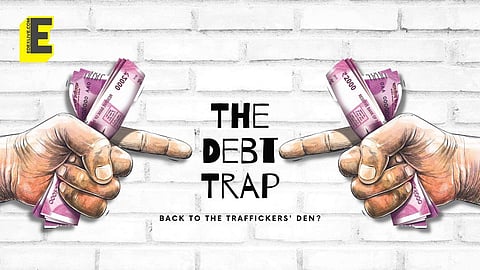

The past year and a few months have been very stressful for all of humanity. While the pandemic rages on, the lives and livelihoods of people have been affected from every aspect possible — financial instability being the biggest challenge in developing and underdeveloped nations. India too had its share of financial calamities — both on the macro and micro level. While the financial problems hit all of us, the poor were obviously affected more. But what about those who are marginalised among the marginalised?
Activists, analysts and researchers working on the ground tell us that the survivors of trafficking, victims of commercial sexual exploitation and sex workers who had started to build their new lives their own way have not just got stuck in a debt trap, but this might have larger repercussions on society. But how is the effect deeper for these survivors?
Shanta Devi*, a sex worker from Andhra Pradesh, was trying to make ends meet by selling flowers but her capital did not suffice, She had to take a loan of Rs 20,000 at 10 per cent interest. "But the moneylender started asking for Rs 4,000 a month instead of the Rs 2,000 that I was supposed to pay. He also threatened us that he will set the police on us if we do not pay. And this is on top of the mental abuse that my family and I have to go through every day," she said. Shanta has been threatened and her attempts to earn a living has been disrupted loan sharks. But why didn't she go to a bank? Because she does not have the required documents said M Meharunnisa, State Convenor of Help Vimukti, an NGO that works closely with people like Shanta.
While a major section of the lower-income group is stuck in a debt trap due to the pandemic and the effects of the lockdown, the threat to these survivors is high, said Snigdha Sen, who works as a Manager at Tafteesh, a consortium of survivors of human trafficking, lawyers, social workers, probation officers, psychologists, researchers, and human rights activists that works for survivors of trafficking. "There is a grave risk of these survivors falling prey to similar miscreants who can lure them into a human trafficking network yet again. While the extent of the threat cannot be adjudged right now, it is definitely a serious issue," she added.
Shantana Mandal*, a resident of the South 24 Parganas, right next to Kolkata, is a human trafficking survivor and has been trying to reintegrate herself into mainstream society. But West Bengal had not only faced a pandemic in 2020 but a destructive riot of a cyclone — Amphan — as well. "We were left with nothing. Our houses were blown away and everything that we owned went with it," she said. "The government promised us Rs 20,000 if our houses were completely destroyed, Rs 15,000, Rs 10,000 and Rs 5,000 for partially destroyed houses. But we got only Rs 5,000. How can we sustain ourselves with that? We have tried raising the issue with the authorities but there has been no response yet," she added. She also said that she had taken a loan from the Bandhan Bank and their agents have been harassing her family ever since — and she has no money at this point as they have been out of work ever since the second lockdown.
Shantana is not only trying to get back on her feet herself but helping others like her as well. Cyclone Yaas hit them this year again but the destruction was comparatively less. This time, the aid is being delivered directly by the state government and not through the panchayats, said Shaswati Mallick, Coordinator, Goranbose Gram Bikash Kendra, a source-area, community-based organisation, working with victims of human trafficking, sexual abuse, domestic violence.
Tafteesh conducted a survey on a small sample size to get an idea of the situation and found that 60 per cent of the survivors have already taken a loan and are being harassed in one way or the other by the moneylenders or bank agents. "The study revealed that Banks or Microfinance Institutions (MFIs) have not relaxed the repayment schedule or set any moratorium period for their repayment at this time of cash scarcity among the vulnerable groups," read the report. The threat is not just of the loans that have become a burden but what these people might have to resort to, to pay the debt off.
*names changed to protect identities
